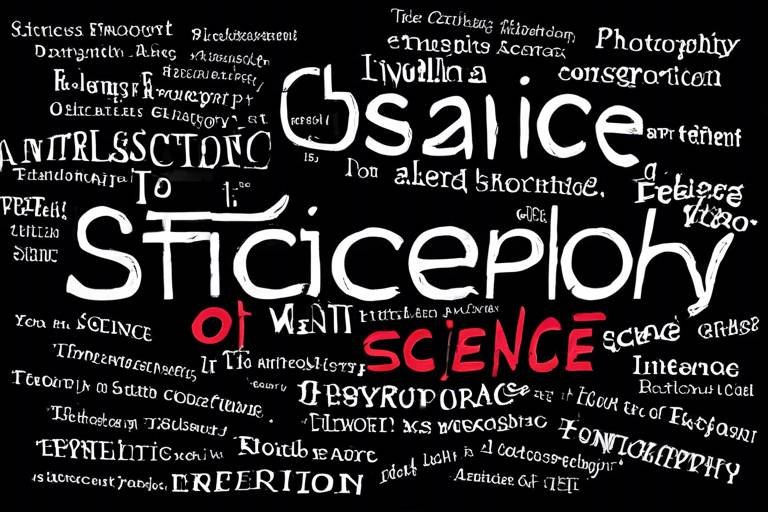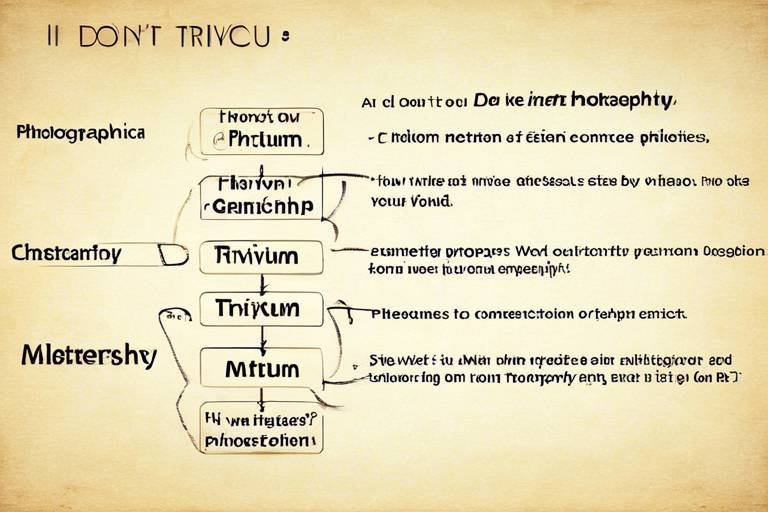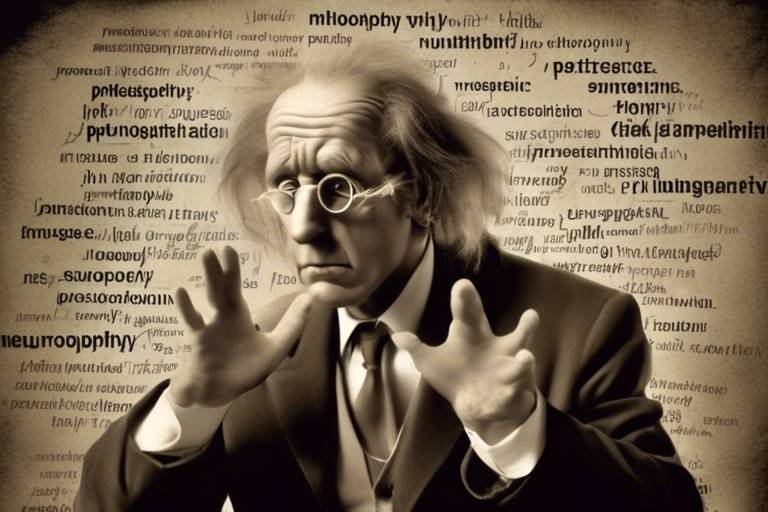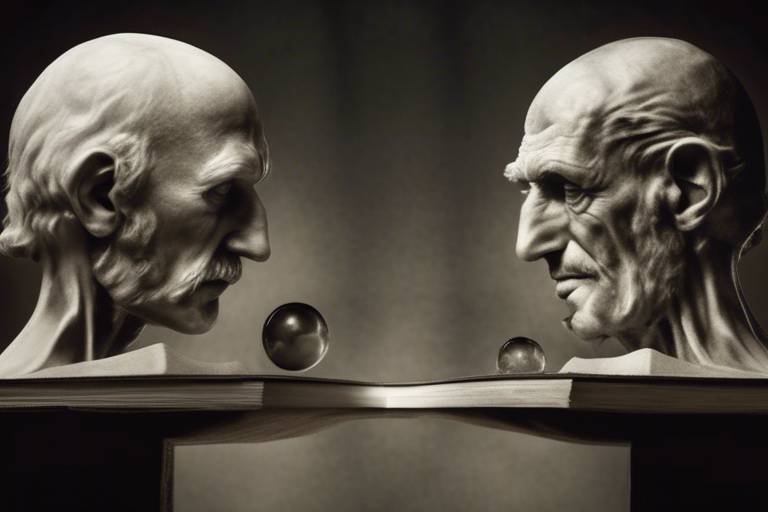Cognitive Dissonance – A Fusion of Philosophy and Psychology
Cognitive dissonance is a fascinating phenomenon that sits at the intersection of philosophy and psychology. Imagine standing at a crossroads, where one path represents your deeply held beliefs and the other leads to conflicting ideas that challenge everything you thought you knew. This mental tug-of-war creates a sense of discomfort, urging you to reconcile these opposing forces. The essence of cognitive dissonance lies in this struggle; it’s about the mental discomfort we experience when our beliefs, attitudes, or behaviors clash. You might find yourself justifying a poor decision or changing your beliefs to align with your actions, all in a bid to restore harmony within your mind.
The implications of cognitive dissonance extend far beyond individual experiences; they shape our interactions, decision-making processes, and even our personal growth. Think of it as a psychological compass, guiding us through the murky waters of conflicting values and beliefs. When we encounter dissonance, it can lead to significant behavioral changes, impacting everything from our health choices to our social interactions. By understanding this complex interplay, we can better navigate our own lives and the choices we make.
The journey into cognitive dissonance is not just an academic exercise; it's a deeply personal exploration. By grappling with our contradictions, we can emerge more self-aware and aligned with our true selves. So, what does cognitive dissonance mean for you? How can recognizing this internal conflict empower you to make better choices? These are the questions that drive us to delve deeper into the philosophical and psychological roots of this intriguing concept.
As we explore the historical roots and psychological theories surrounding cognitive dissonance, keep in mind that this isn’t just a theoretical discussion. It’s a real-world phenomenon that resonates with our everyday lives. From the ethical dilemmas we face to our health and lifestyle choices, cognitive dissonance is always lurking in the background, influencing our thoughts and actions.
In the following sections, we will unpack the philosophical influences that have shaped our understanding of cognitive dissonance, delve into real-life examples, and explore the personal growth opportunities that arise from confronting our own inconsistencies. Join us on this enlightening journey as we unravel the complexities of cognitive dissonance and its profound impact on our lives.

Understanding Cognitive Dissonance
Cognitive dissonance is a fascinating psychological phenomenon that occurs when a person experiences mental discomfort due to holding two or more contradictory beliefs, values, or attitudes simultaneously. Imagine you’re a smoker who knows that smoking is harmful to your health. You might feel a nagging tension between your desire to quit and your habit of smoking. This internal conflict can lead to a state of dissonance, which is often uncomfortable and can push individuals to seek resolution. But how do we resolve this internal tug-of-war?
Most people will subconsciously aim to reduce this discomfort in one of three ways: by changing their beliefs, justifying their behavior, or ignoring the conflicting information. It's like trying to balance on a seesaw; if one side is too heavy, you’ll either have to lighten that side or add weight to the other to regain balance. This balancing act is crucial to our mental well-being, as unresolved cognitive dissonance can lead to stress, anxiety, and even depression.
To put it simply, cognitive dissonance is our mind's way of ensuring consistency in our beliefs and actions. This concept is not just a theoretical construct; it has real-world implications that affect our daily lives, from the choices we make about our health to the political beliefs we hold dear. For instance, if you value honesty but find yourself telling a lie, the dissonance created by this contradiction may prompt you to either justify the lie or change your perception of honesty itself. It’s a dynamic process that influences our decision-making and behavior in profound ways.
Understanding cognitive dissonance is essential because it helps us become more aware of our thought processes and the motivations behind our actions. When we recognize this internal conflict, we can take steps to address it, leading to personal growth and improved mental health. By confronting our inconsistencies, we can align our actions more closely with our values, ultimately fostering a more authentic and fulfilling life.

The Historical Roots
The concept of cognitive dissonance is not a recent invention; its roots stretch deep into the philosophical soil of human thought. This fascinating idea has been shaped by various thinkers across centuries, each contributing a unique perspective on the nature of belief and knowledge. To truly appreciate cognitive dissonance, we must look back at the philosophical giants who laid the groundwork for our understanding of conflicting beliefs.
Philosophers like Socrates and René Descartes were instrumental in exploring the intricacies of belief systems. Socrates, with his method of questioning, encouraged individuals to reflect on their beliefs and the contradictions that might arise from them. His approach can be seen as a precursor to the discomfort we experience when faced with cognitive dissonance. Similarly, Descartes’ emphasis on doubt and certainty challenged individuals to scrutinize their beliefs, fostering a deeper understanding of the mind's workings.
As we delve deeper into the historical context, we find that the interplay between ethics and morality is a significant aspect of cognitive dissonance. Conflicting morals can create a storm of psychological stress, pushing individuals to reconcile their actions with their values. For instance, consider the ethical dilemmas faced by professionals who may prioritize profit over social responsibility. This dissonance can lead to a profound internal struggle, prompting changes in behavior or belief systems to alleviate the discomfort.
Moreover, the realm of existential philosophy has also addressed the discomfort arising from conflicting beliefs. Thinkers like Jean-Paul Sartre and Simone de Beauvoir focused on the human quest for meaning amidst the chaos of existence. They highlighted the struggle individuals face when their beliefs clash with their lived experiences, emphasizing the importance of coherence in making sense of one’s life choices. This existential lens offers valuable insights into how cognitive dissonance plays a crucial role in shaping our identities and guiding our decisions.
In summary, the historical roots of cognitive dissonance are deeply intertwined with philosophical inquiry. By examining the contributions of early thinkers, we can better understand the psychological implications of holding conflicting beliefs. This understanding not only enriches our grasp of cognitive dissonance but also sheds light on the ongoing human pursuit of harmony in thought and action.

Philosophical Influences
The roots of cognitive dissonance can be traced back through the annals of philosophy, where early thinkers laid the groundwork for our understanding of belief systems. Philosophers like Socrates and René Descartes explored the nature of knowledge, truth, and belief, which ultimately paved the way for the psychological theories we now embrace. Imagine Socrates, engaging in dialogue with his students, challenging them to question their own beliefs. This method of inquiry not only highlights the importance of self-reflection but also illustrates how conflicting ideas can create a mental tug-of-war. In this context, cognitive dissonance emerges as a natural response to the discomfort of holding opposing views.
Descartes, on the other hand, famously declared, "I think, therefore I am." This statement emphasizes the significance of thought in shaping our existence. However, it also raises questions about the nature of belief and certainty. When we encounter information that contradicts our established beliefs, the resulting dissonance can lead us to question our very identity and values. This philosophical backdrop is crucial for understanding how cognitive dissonance operates in our lives.
Moreover, the interplay between ethics and cognitive dissonance is particularly fascinating. Consider the moral dilemmas we face daily—whether it's choosing between honesty and loyalty or weighing personal gain against the greater good. These conflicts can lead to significant psychological stress, as individuals grapple with their moral compass. For example, a person might justify lying to protect a friend, creating a dissonance between their value of honesty and the action they take. This struggle not only reveals the complexity of human behavior but also highlights the profound impact of philosophical thought on our decision-making processes.
Existential philosophers, too, have delved into the discomfort of conflicting beliefs. Thinkers like Jean-Paul Sartre and Friedrich Nietzsche emphasized the individual's struggle for meaning in a world rife with contradictions. They posited that the search for coherence in our beliefs is a fundamental aspect of the human experience. When faced with dissonance, we often embark on a journey to find purpose, whether through self-discovery, personal growth, or redefining our values. This existential lens enriches our understanding of cognitive dissonance, framing it not just as a psychological phenomenon but as a deeply philosophical quest for alignment in our beliefs and actions.
In summary, the philosophical influences on cognitive dissonance provide a rich tapestry of thought that enhances our understanding of this complex phenomenon. By examining the contributions of early philosophers, we gain insight into the intricate relationship between belief, ethics, and the human experience. This exploration not only informs psychological theories but also encourages us to confront our own inconsistencies, paving the way for personal growth and a more authentic life.
- What is cognitive dissonance? Cognitive dissonance is the mental discomfort experienced when holding conflicting beliefs or values, often leading to changes in attitudes or behaviors to achieve harmony.
- Who developed the theory of cognitive dissonance? The theory was developed by psychologist Leon Festinger in the 1950s.
- How can cognitive dissonance affect decision-making? It can lead individuals to justify their choices or alter their beliefs to reduce the discomfort caused by conflicting cognitions.
- Can cognitive dissonance be beneficial? Yes, understanding and addressing cognitive dissonance can foster personal growth, self-awareness, and healthier decision-making.

Ethics and Morality
When we talk about ethics and morality, we’re diving into a deep ocean of beliefs, values, and principles that govern our behavior. Imagine standing at a crossroads, where one path leads to personal gain and the other to a moral high ground. This is where cognitive dissonance often rears its head, creating a tumultuous storm in our minds. The discomfort we feel when our actions contradict our values can be profound, pushing us to rethink our choices and beliefs.
Consider this: you might value honesty and integrity, yet find yourself in a situation where telling a small lie seems harmless. The internal conflict that arises from this situation is a classic example of cognitive dissonance. This conflict can lead to significant psychological stress, as individuals grapple with the implications of their choices. To ease this discomfort, some people might justify their actions by downplaying the severity of the lie or by convincing themselves that the end justifies the means.
This interplay between cognitive dissonance and ethical decision-making is crucial. It can lead to a variety of outcomes, from positive changes in behavior to a complete disregard for one’s moral compass. For instance, a person who values environmental sustainability but drives a gas-guzzling car may experience dissonance. To resolve this, they might either change their behavior by opting for a more eco-friendly vehicle or rationalize their choice by claiming that their individual actions won’t make a difference in the grand scheme of things.
The psychological toll of these conflicting morals can be significant. Research indicates that individuals who frequently experience cognitive dissonance regarding ethical issues often report higher levels of stress and anxiety. This is not just about feeling guilty; it’s about the fundamental challenge of reconciling who we are with what we do. In many cases, this psychological discomfort can serve as a catalyst for personal growth, prompting individuals to align their actions with their core values.
To illustrate this further, let’s take a look at a simple table that summarizes the relationship between cognitive dissonance, ethics, and behavior:
| Cognitive Dissonance | Ethical Dilemma | Possible Resolutions |
|---|---|---|
| Feeling guilty about lying | Choosing between honesty and self-interest | Justifying the lie or changing behavior |
| Conflict between personal gain and fairness | Deciding whether to cheat for a promotion | Rationalizing the cheat or opting for fairness |
| Struggle with environmental impact | Using a non-eco-friendly car | Switching to a greener option or downplaying the impact |
Ultimately, the journey through cognitive dissonance in the realm of ethics and morality is not just about resolving conflicts; it’s about understanding ourselves better. It’s about recognizing that our choices reflect who we are and who we aspire to be. By confronting these dissonances head-on, we can cultivate a more authentic existence, where our actions align harmoniously with our values. So, the next time you find yourself at that metaphorical crossroads, remember that the discomfort you feel may just be the universe nudging you toward a path of greater integrity and self-awareness.
- What is cognitive dissonance?
Cognitive dissonance is the mental discomfort experienced when holding conflicting beliefs or values, leading to changes in attitudes or behaviors to achieve harmony.
- How does cognitive dissonance affect ethical decision-making?
Cognitive dissonance can lead to significant psychological stress as individuals struggle to reconcile conflicting morals, often resulting in behavioral changes.
- Can cognitive dissonance lead to personal growth?
Yes, understanding and confronting cognitive dissonance can foster greater self-awareness and alignment between beliefs and actions, promoting personal development.

Existential Philosophy
Existential philosophy dives deep into the human condition, exploring the fundamental questions of existence, meaning, and choice. Think of it as a spotlight on the stage of life, illuminating the struggles we face when confronted with conflicting beliefs. When we talk about cognitive dissonance, existential thinkers like Søren Kierkegaard and Jean-Paul Sartre come to mind. They emphasized the importance of personal choice and the anxiety that arises from the freedom to choose. This can create a sense of dissonance when our actions don’t align with our beliefs or values.
Imagine standing at a crossroads, where one path represents societal expectations and the other embodies your true desires. This scenario encapsulates the essence of existential thought. The discomfort of choosing one path over another often leads to a profound sense of dissonance. As we navigate through life, we frequently encounter situations where our choices clash with our beliefs, causing us to question our very existence. For instance, when someone chooses a high-paying job that conflicts with their passion for art, they may experience a tug-of-war between financial security and personal fulfillment.
Existentialists argue that this dissonance is not merely a source of discomfort but also an opportunity for growth. They suggest that grappling with conflicting beliefs can lead to a deeper understanding of ourselves and our values. Instead of avoiding the discomfort, we should embrace it, using it as a catalyst for change. By confronting our dissonance, we can redefine our values and align our actions with our true selves. This process of self-examination is akin to polishing a rough stone, revealing the clarity and brilliance that lies beneath.
Moreover, existential philosophy encourages individuals to take responsibility for their choices. It reminds us that we are the architects of our lives, and with that power comes the weight of accountability. When we acknowledge the dissonance between our beliefs and actions, we are prompted to make conscious decisions that reflect our authentic selves. This journey may not be easy, but it is essential for personal growth and fulfillment. In essence, the struggle against cognitive dissonance can lead us to a more meaningful existence.
In summary, existential philosophy provides a rich framework for understanding cognitive dissonance. By embracing the discomfort that comes from conflicting beliefs, we can embark on a transformative journey towards self-discovery and authenticity. So the next time you find yourself in a situation where your values clash, remember that this is not just a hurdle to overcome, but a profound opportunity to explore the depths of your existence.
- What is cognitive dissonance? Cognitive dissonance is a psychological phenomenon that occurs when a person experiences mental discomfort due to holding conflicting beliefs or values.
- How does existential philosophy relate to cognitive dissonance? Existential philosophy explores the struggle for meaning and coherence in life choices, which often leads to cognitive dissonance when beliefs conflict with actions.
- Can cognitive dissonance lead to personal growth? Yes, confronting cognitive dissonance can enhance self-awareness and encourage individuals to align their actions with their true beliefs, promoting personal development.

Psychological Theories
Cognitive dissonance theory, a groundbreaking concept introduced by Leon Festinger in 1957, fundamentally reshaped our understanding of human psychology. At its core, the theory posits that individuals are driven by a deep-seated desire for internal consistency. When faced with conflicting cognitions—such as beliefs, attitudes, or values—this inconsistency creates a state of mental discomfort, or dissonance. Imagine trying to ride a bicycle with one wheel flat; it’s not just uncomfortable, but it also prevents you from moving forward effectively. This analogy highlights the struggle individuals face when their beliefs clash.
To alleviate this discomfort, people often engage in various strategies to restore harmony among their thoughts. These strategies can be categorized into three main approaches:
- Changing beliefs: One might abandon or alter a belief to align better with their actions. For example, a person who smokes may downplay the health risks associated with smoking to continue their habit without feeling guilty.
- Acquiring new information: Individuals often seek out information that supports their existing beliefs while dismissing contradictory evidence. This selective exposure reinforces their current mindset, akin to wearing blinders that prevent them from seeing the full picture.
- Minimizing the importance: Another common tactic is trivializing the significance of the conflict. For instance, someone might convince themselves that their unhealthy eating habits are not a big deal, thus reducing the psychological impact of their choices.
Festinger’s theory has profound implications not just for individual behavior, but also for broader societal issues. For example, in political contexts, cognitive dissonance can lead to a phenomenon known as confirmation bias, where individuals only seek out information that aligns with their pre-existing beliefs. This behavior can create echo chambers, where conflicting viewpoints are not just ignored but actively rejected. Understanding these psychological mechanisms can help us navigate our own biases and foster more constructive dialogues.
Moreover, cognitive dissonance isn’t just a hurdle; it can also serve as a catalyst for personal growth. When individuals confront the discomfort of dissonance, they may be prompted to reevaluate their beliefs and make more informed decisions. This process can lead to greater self-awareness and authenticity, encouraging individuals to align their actions with their core values. In essence, while cognitive dissonance can be uncomfortable, it also presents an opportunity for transformation and deeper understanding of oneself.
In summary, the psychological theories surrounding cognitive dissonance offer valuable insights into how we think, behave, and interact with the world. By recognizing the dissonance within ourselves, we can take meaningful steps towards resolving conflicts and achieving a more harmonious existence.

Real-Life Examples
Cognitive dissonance is not just a theoretical concept; it permeates our daily lives in ways we often overlook. Imagine standing in front of a delicious slice of cake while trying to stick to a diet. Your taste buds scream for a bite, but your mind battles with the guilt of breaking your commitment to healthy eating. This internal conflict is a classic example of cognitive dissonance, where the desire for immediate pleasure clashes with long-term health goals. The discomfort that arises from this situation often leads individuals to rationalize their choices, perhaps by telling themselves, "I’ll just exercise more tomorrow," thus easing the tension between conflicting beliefs.
Another vivid illustration can be found in the realm of smoking. A smoker may be fully aware of the health risks associated with smoking – the knowledge that it can lead to serious diseases – yet they continue to smoke. Here, cognitive dissonance manifests as the smoker grapples with the desire to enjoy their habit while simultaneously acknowledging the potential harm. To resolve this dissonance, they might downplay the risks, convince themselves that they can quit anytime, or emphasize the social aspect of smoking, thus aligning their behavior with their beliefs about enjoyment and socialization.
In social and political contexts, cognitive dissonance can significantly influence our perceptions and decisions. For instance, consider a person who identifies as environmentally conscious but drives a gas-guzzling vehicle. The conflict between their self-image and their actions can lead to discomfort. To alleviate this, they might justify their choice by claiming that their car is necessary for their job or that they recycle more than others. This selective reasoning helps them maintain a positive self-image while continuing behaviors that contradict their values.
Moreover, cognitive dissonance plays a role in consumer behavior. When people buy expensive products, they often experience a sense of buyer's remorse, especially if they encounter cheaper alternatives shortly after their purchase. To mitigate this discomfort, they may convince themselves of the superior quality of the product they bought or highlight the prestige associated with owning it. This phenomenon illustrates how cognitive dissonance can lead to a form of mental gymnastics that protects our self-esteem and decision-making processes.
In summary, cognitive dissonance is a powerful force that influences our daily choices and behaviors. Whether it's about health, social identity, or consumer habits, the struggle between conflicting beliefs and actions is a common human experience. By recognizing these patterns, we can better understand our motivations and the psychological mechanisms that drive our decisions.
- What is cognitive dissonance?
Cognitive dissonance is the mental discomfort experienced when holding two or more contradictory beliefs, values, or ideas, often leading to changes in attitudes or behaviors to achieve consistency.
- How does cognitive dissonance affect decision-making?
It influences decision-making by causing individuals to rationalize their choices, often leading to justifications that align their actions with their beliefs, even if those beliefs are contradictory.
- Can cognitive dissonance lead to personal growth?
Yes, by confronting inconsistencies in beliefs and behaviors, individuals can foster self-awareness and make more authentic choices, contributing to personal development.

Health and Lifestyle Choices
Cognitive dissonance often rears its head in the realm of health and lifestyle choices, creating a tug-of-war between our desires and our values. Imagine this: you’re sitting on the couch, a tub of ice cream in one hand and a health magazine in the other. The magazine touts the benefits of a balanced diet and regular exercise, while the ice cream whispers sweet nothings about indulgence and comfort. This scenario perfectly encapsulates the struggle many face when their actions clash with their beliefs about health.
Many individuals grapple with the desire for well-being while simultaneously indulging in behaviors that contradict those aspirations. For instance, someone may believe that smoking is harmful and detrimental to their health, yet they continue to smoke. The discomfort stemming from this contradiction can lead to a range of responses, from rationalizing their behavior to eventually quitting. This internal conflict is a classic example of cognitive dissonance at play, where the individual must reconcile their actions with their beliefs.
To illustrate this further, let’s consider some common health-related choices that often lead to cognitive dissonance:
- Dietary Choices: Many people know that consuming excessive sugar can lead to health issues, yet they find themselves reaching for that sugary snack. The dissonance arises when they try to justify their choice by saying, "I deserve this treat after a long day."
- Exercise Habits: Individuals may recognize the importance of regular exercise but often find themselves making excuses to skip the gym, leading to feelings of guilt and frustration.
- Sleep Patterns: Acknowledging the need for quality sleep but choosing to binge-watch a series instead can create a conflict between the desire for rest and the enjoyment of entertainment.
These examples highlight how cognitive dissonance manifests in our daily lives, influencing our decisions and behaviors. The pressure to conform to societal norms or the influence of peer behavior can exacerbate this dissonance. For instance, in a social setting where unhealthy eating is the norm, an individual may choose to indulge despite knowing the negative impacts on their health. This behavior can lead to feelings of guilt and reinforce the cycle of dissonance.
However, recognizing and confronting these inconsistencies can be a powerful catalyst for change. By acknowledging the discomfort that arises from cognitive dissonance, individuals can begin to align their actions with their values. For example, someone who acknowledges their unhealthy eating habits can take proactive steps, such as meal planning or seeking support from friends, to create a healthier lifestyle that resonates with their beliefs.
In conclusion, health and lifestyle choices are deeply intertwined with the concept of cognitive dissonance. By understanding this relationship, individuals can better navigate their choices, leading to more authentic living and improved well-being. The journey to reconcile conflicting beliefs and behaviors may be challenging, but it ultimately fosters personal growth and a healthier lifestyle.
- What is cognitive dissonance? Cognitive dissonance is the mental discomfort experienced when holding conflicting beliefs or values, often leading to changes in attitudes or behaviors to achieve harmony.
- How does cognitive dissonance affect health choices? It creates a conflict between what individuals know is healthy and their actual behaviors, leading to feelings of guilt or justification for unhealthy choices.
- Can cognitive dissonance lead to positive change? Yes, by recognizing and confronting dissonance, individuals can align their actions with their values, promoting healthier choices and personal growth.

Social and Political Beliefs
Cognitive dissonance plays a significant role in shaping our . Imagine you're at a party, surrounded by friends who passionately support a political candidate you secretly dislike. You find yourself nodding along, even though your gut tells you otherwise. This is cognitive dissonance in action—holding conflicting beliefs about your values and the opinions of those around you. It's like trying to fit a square peg into a round hole; it just doesn't work, and yet, we often force it to fit.
In the realm of politics, cognitive dissonance can lead to a phenomenon known as selective exposure. This is where individuals gravitate towards information that aligns with their existing beliefs, intentionally avoiding any evidence that contradicts their views. For example, a person who strongly believes in climate change may only read articles that support this view, while dismissing scientific studies that question certain aspects of it. This behavior is not merely a quirk; it’s a survival mechanism for the mind, protecting us from the discomfort of conflicting ideas.
Furthermore, cognitive dissonance can manifest in how we engage with social issues. Consider someone who advocates for environmental conservation but drives a gas-guzzling SUV. The internal conflict between their advocacy and their lifestyle choices can lead to feelings of guilt and unease. To alleviate this discomfort, they might justify their actions by claiming that their vehicle is necessary for family needs or that they recycle diligently. This mental gymnastics helps them maintain a sense of coherence, even if it means bending the truth a little.
The implications of cognitive dissonance extend beyond individual beliefs; they can influence group dynamics and societal trends. When we witness a political party or social movement, the members often share a collective belief system that can sometimes ignore dissenting opinions. This can create an echo chamber, where only reinforcing ideas circulate, further entrenching cognitive dissonance. The result? A polarized society where understanding and compromise become increasingly rare.
To illustrate the impact of cognitive dissonance on social and political beliefs, consider the following table that summarizes how it can affect decision-making processes and behaviors:
| Situation | Conflict | Possible Resolutions |
|---|---|---|
| Supporting a political party | Disagreement with a party policy | Rationalizing the policy or distancing from the party |
| Advocating for social justice | Engaging in behavior that contradicts advocacy | Justifying behavior or changing habits |
| Believing in climate change | Driving a non-eco-friendly vehicle | Justifying the choice based on personal needs |
In conclusion, the intersection of cognitive dissonance with our social and political beliefs reveals a complex landscape of human thought and behavior. By understanding this phenomenon, we can begin to navigate our own beliefs more effectively, fostering a deeper awareness of how we engage with the world around us. After all, confronting dissonance can lead to growth, understanding, and, ultimately, a more cohesive society.
- What is cognitive dissonance? Cognitive dissonance is the mental discomfort experienced when holding conflicting beliefs or values, leading to changes in attitudes or behaviors to achieve harmony.
- How does cognitive dissonance affect decision-making? It can lead individuals to rationalize their choices or seek out information that aligns with their beliefs, often ignoring contradictory evidence.
- Can cognitive dissonance lead to personal growth? Yes, by confronting inconsistencies in beliefs, individuals can foster greater self-awareness and make more authentic choices.

Implications for Personal Growth
Understanding cognitive dissonance is like holding up a mirror to our own thoughts and actions. It reveals the cracks in our belief systems and encourages us to confront those uncomfortable inconsistencies. This process can be incredibly enlightening and ultimately liberating. When we recognize the discomfort that arises from conflicting beliefs, we are given a unique opportunity to grow. Instead of shying away from these feelings, we can lean into them and use them as a catalyst for personal development.
One of the most significant implications of cognitive dissonance for personal growth is the enhancement of self-awareness. When we experience dissonance, it forces us to examine our beliefs and values more closely. Are we living in alignment with our core principles, or are we merely going through the motions? This introspection can lead to profound realizations about what truly matters to us. For example, someone who values health but indulges in fast food may come to understand that their actions are at odds with their beliefs. This recognition can spark a change in behavior, leading to healthier lifestyle choices.
Moreover, navigating the discomfort of cognitive dissonance can significantly boost our emotional resilience. Life is full of challenges and contradictions, and learning to manage the discomfort that arises from these experiences is a vital skill. By facing our dissonance head-on, we develop the ability to adapt our beliefs and behaviors in response to new information. This adaptability not only strengthens our mental fortitude but also fosters a growth mindset, where we view challenges as opportunities for learning rather than obstacles.
In addition to self-awareness and emotional resilience, cognitive dissonance plays a crucial role in shaping our behavioral change strategies. When we become aware of the disconnect between our beliefs and actions, we are more likely to seek solutions that align them. This might involve setting specific goals, seeking support from others, or even engaging in therapy to unpack deeper issues. For instance, someone who values environmental sustainability but drives a gas-guzzling car might start exploring options for public transportation or investing in an electric vehicle. The key is that the recognition of dissonance acts as a powerful motivator for change.
To illustrate the journey from cognitive dissonance to personal growth, consider the following table that outlines the stages of this transformation:
| Stage | Description |
|---|---|
| Awareness | Recognizing the conflict between beliefs and behaviors. |
| Reflection | Examining the underlying reasons for the dissonance. |
| Adaptation | Making conscious changes to align beliefs with actions. |
| Growth | Developing greater self-awareness and emotional resilience. |
In conclusion, the implications of cognitive dissonance for personal growth are profound. By embracing the discomfort it brings, we can embark on a journey of self-discovery that enhances our understanding of ourselves and the world around us. This process not only enriches our lives but also empowers us to live authentically, making choices that resonate with our true selves. So, the next time you feel that nagging discomfort of conflicting beliefs, remember: it’s not just a challenge; it’s an invitation to grow.
- What is cognitive dissonance? Cognitive dissonance is the mental discomfort experienced when holding conflicting beliefs or values, leading individuals to adjust their attitudes or behaviors to achieve harmony.
- How can cognitive dissonance lead to personal growth? By recognizing and confronting the discomfort from conflicting beliefs, individuals can enhance their self-awareness, emotional resilience, and make positive behavioral changes.
- Can cognitive dissonance affect decision-making? Yes, it can significantly influence decision-making by prompting individuals to seek information that aligns with their beliefs while avoiding contradictory evidence.

Emotional Resilience
Emotional resilience is like a mental rubber band; it allows us to stretch and bend in the face of life's challenges without breaking. When we encounter cognitive dissonance, it serves as a test of our emotional fortitude. Think about it: when our beliefs clash with our actions, it can feel like a tug-of-war inside our minds. This dissonance can trigger discomfort, anxiety, and even stress, but it also presents an opportunity for growth. By facing these uncomfortable feelings head-on, we can develop a deeper understanding of ourselves and our values.
One of the most fascinating aspects of emotional resilience is how it can be cultivated. Just as a muscle grows stronger with exercise, our resilience can improve through practice. Here are some strategies that can help:
- Self-Reflection: Taking time to reflect on your thoughts and feelings can help you identify areas of dissonance. Ask yourself questions like, "Why do I feel this way?" or "What beliefs are conflicting?" This introspection can pave the way for clarity.
- Embracing Change: Learning to accept change as a part of life can lessen the impact of cognitive dissonance. When you realize that change is inevitable, you become more adaptable, which strengthens your resilience.
- Seeking Support: Sometimes, talking things out with friends, family, or a professional can provide new perspectives. Don't hesitate to lean on your support network when grappling with conflicting beliefs.
Moreover, emotional resilience allows us to navigate the complexities of our feelings and beliefs in a more constructive way. For instance, when faced with the dissonance of wanting to live a healthy lifestyle while indulging in unhealthy foods, resilient individuals might choose to explore the underlying reasons for their choices. Are they eating for comfort? Are they influenced by social situations? By understanding the "why" behind their actions, they can make more informed decisions that align with their values.
In essence, fostering emotional resilience not only helps us manage the discomfort of cognitive dissonance but also empowers us to grow from it. As we learn to confront our conflicting beliefs and feelings, we become more self-aware and better equipped to make choices that resonate with our true selves. This journey of self-discovery can be both enlightening and transformative, leading to a more authentic and fulfilling life.
- What is emotional resilience?
Emotional resilience is the ability to adapt to stressful situations and bounce back from adversity. - How can I improve my emotional resilience?
Improving emotional resilience can be achieved through self-reflection, embracing change, and seeking support from others. - What role does cognitive dissonance play in emotional resilience?
Cognitive dissonance challenges us to confront our conflicting beliefs, which can ultimately lead to greater self-awareness and emotional growth.

Behavioral Change Strategies
When it comes to navigating the often turbulent waters of cognitive dissonance, implementing effective can be a game-changer. Think of it like steering a ship through a storm; you need a solid plan and the right tools to keep your course steady. First and foremost, recognizing the dissonance is essential. This awareness allows individuals to confront the conflicting beliefs or values head-on, rather than avoiding them. For instance, if you find yourself justifying unhealthy eating habits while also wanting to lead a healthier lifestyle, acknowledging this conflict is the first step toward change.
Once you’ve identified the dissonance, setting clear and achievable goals can provide direction. Goals act like a lighthouse guiding you through the fog. Start with small, manageable changes that align with your desired outcome. If your aim is to eat healthier, perhaps begin by incorporating more fruits and vegetables into your meals. This gradual approach makes the transition feel less overwhelming and more attainable, reducing the mental friction associated with drastic shifts.
Another effective strategy is to surround yourself with supportive influences. Engaging with people who share your goals can create a positive feedback loop that reinforces your commitment to change. Whether it’s joining a fitness group, participating in online forums, or even just sharing your intentions with friends, having a support system can provide both accountability and encouragement. It’s like having a crew on your ship, working together to navigate the stormy seas.
Additionally, self-reflection plays a crucial role in resolving cognitive dissonance. Taking the time to journal or meditate can help clarify your thoughts and feelings, allowing you to explore the underlying reasons behind your conflicting beliefs. This introspection can reveal valuable insights and help you understand what truly matters to you, which is essential for aligning your actions with your values.
Lastly, consider the power of positive reinforcement. Rewarding yourself for making progress, no matter how small, can boost your motivation and reinforce the changes you’re trying to implement. This could be as simple as treating yourself to a favorite activity or indulging in a small guilty pleasure after hitting a milestone. By celebrating your achievements, you create a positive association with the behaviors you want to adopt, making it more likely that you’ll stick with them in the long run.
In summary, tackling cognitive dissonance through behavioral change strategies is all about awareness, goal-setting, support, self-reflection, and positive reinforcement. By integrating these approaches into your life, you can foster a greater sense of harmony between your beliefs and actions, paving the way for personal growth and a more authentic existence.
- What is cognitive dissonance? Cognitive dissonance is the mental discomfort experienced when holding conflicting beliefs or values, often leading to changes in attitudes or behaviors to achieve harmony.
- How can I identify cognitive dissonance in my life? Look for situations where your actions contradict your beliefs or values, such as justifying unhealthy habits while wanting to be healthy.
- What are some effective strategies to reduce cognitive dissonance? Effective strategies include recognizing the dissonance, setting achievable goals, surrounding yourself with supportive influences, engaging in self-reflection, and using positive reinforcement.
- Can cognitive dissonance lead to personal growth? Yes, understanding and confronting cognitive dissonance can facilitate personal development by fostering greater self-awareness and alignment between beliefs and actions.
Frequently Asked Questions
- What is cognitive dissonance?
Cognitive dissonance is the mental discomfort you feel when you hold conflicting beliefs or values. It often pushes individuals to change their attitudes or behaviors to achieve a sense of harmony.
- Who developed the theory of cognitive dissonance?
The theory of cognitive dissonance was developed by psychologist Leon Festinger in the 1950s. His work highlighted how people strive for internal consistency in their beliefs and actions.
- How does cognitive dissonance affect decision-making?
Cognitive dissonance can significantly impact decision-making by causing individuals to justify their choices, even when they know those choices conflict with their values. This can lead to altered perceptions and behaviors.
- Can cognitive dissonance lead to personal growth?
Absolutely! Understanding and confronting cognitive dissonance can enhance self-awareness and encourage individuals to align their beliefs with their actions, fostering personal growth and development.
- What are some real-life examples of cognitive dissonance?
Everyday examples include justifying unhealthy eating habits while wanting to be fit, or supporting a political view while grappling with contradictory information. These situations illustrate the struggle between conflicting beliefs.
- How can one resolve cognitive dissonance?
Resolving cognitive dissonance often involves reevaluating one's beliefs, seeking new information, or altering behaviors to create consistency. This process can lead to healthier choices and more authentic living.
- What role does cognitive dissonance play in ethics and morality?
Cognitive dissonance can create significant psychological stress when individuals face conflicting morals. This tension often influences ethical decision-making and can lead to behavioral changes as people strive for moral coherence.
- How does cognitive dissonance relate to emotional resilience?
Navigating cognitive dissonance can enhance emotional resilience by teaching individuals to manage discomfort and adapt their beliefs in response to new information, ultimately leading to better mental health.



















